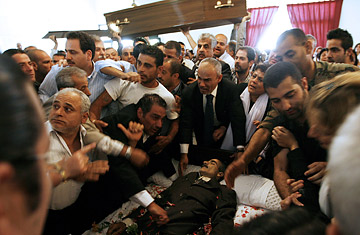
Relatives and friends mourn over the body of a Druze man killed in recent clashes in Shwayfat near Beirut on Tuesday.
Sleiman Jaafar's smiling, thinly bearded face beams down from his "martyr's" portrait at the funeral procession inching its way along the narrow street in Qmatiyeh, a small village clinging to a mountainside overlooking Beirut. Handfuls of rice and pink and white rose petals hurled from windows and balconies shower the throng of mourners below. The funeral was a moment to absorb the human cost of the recent deadly clashes between Hizballah and the Lebanese government in which nearly 40 people are thought to have died. But it also generated a mix of seething anger, anxiety and an ominous feeling that more violence is to come.
Jaafar's coffin, covered in the yellow emblem of the militant Shi'ite Hizballah, is borne aloft on the shoulders of six comrades dressed in camouflage uniforms and green berets. Dozens of armed Hizballah militants march alongside, draped in green webbing heavy with ammunition pouches, grenades and walkie-talkies. They carry their rifles at chest height, baseball caps shading their grim faces as they scan the surrounding area for potential trouble. Jaafar was killed two days earlier — wounded by a sniper and executed with a bullet in the head, according to residents —during heavy clashes between Hizballah and the Druze followers of Walid Jumblatt, an arch-critic of the Shi'ite party, in the hills of the Aley district above Beirut. Because of the tensions, there must be no shooting in the air during the funeral procession, a Hizballah organizer instructs the mourners. "Save your bullets for the Israelis and the traitors," he adds, referring the supporters of the Western-backed government.
Qmatiyeh is one of two predominantly Shi'ite villages nestled in a mainly Druze area at the northern end of the Chouf mountains. The village's isolation from the densely Shi'ite-populated areas of southern Beirut, clearly visible from here and where Hizballah holds sway, is a source of unease for the residents who look to the Shi'ite group for protection. "I don't think it's calm enough yet to feel confident," says Hussam Najjar, a criminal court magistrate. With his pressed gray suit, blue tie, sunglasses and neatly trimmed mustache, Najjar looked out of place among the bearded gunmen and local villagers. But he voiced his foreboding for the future of Shi'ite-Druze relations in the area once the current crisis is over. "We have been neighbors for hundreds of years, but we are a minority here and we need guarantees for our safety. This will cause problems for many years to come," he said.
Sources close to Hizballah said that dozens of the group's fighters deployed from southern Beirut to the Qmatiyeh area on Monday night, taking up position in the woods and dense undergrowth surrounding the village to protect its residents from Druze incursions. Hizballah is thought to have lost 13 fighters in the battle with the Druze militants, a significant number for one of the world's most professional guerrilla armies. Hizballah militants told TIME that the Druze fighters had fought them from dug-in positions prepared well in advance of last week's outbreak of violence between the supporters of the government and the opposition. They claimed the Druze used snipers, mortars and even twin-barreled 23mm anti-aircraft guns to blast at the advancing Hizballah.
The fighting ended with the Shi'ites demanding that Jumblatt's Druze forces must turn over all their medium and heavy weapons. "We want everything from rocket-propelled grenade launchers and up," says Hussam Asrawi, a senior official with the Syrian Social Nationalist Party, a secular opposition party and ally of Hizballah. But Jumblatt has signaled some defiance, saying that he is willing to yield his weapons to the Lebanese army, but "our dignity is important and the people of the [Chouf] will not allow anyone to enter their homes."
Much rests on the outcome of an arbitration effort by a delegation of Arab foreign ministers set to begin in Beirut Wednesday. But few hold out much hope that the Arab delegation will succeed where months of Arab and international mediation to end the 18-month political crisis have led nowhere. "The negotiations are failing. The fighting will continue," predicts Asrawi of the SSNP.
The Druze are legendary for their ferocity in defending their traditional mountain stronghold in the Chouf. It was reported that some Druze supporters of the Hizballah coalition even switched sides in the battles to join Jumblatt's men against the Shi'ites of Hizballah — politics suddenly taking a backseat to deeper feelings of loyalty to the clan and sect and unity against the outsider. "We are believers in peace and co-existence, but we will not accept any aggression against us," said Shawki Zeidan, a veteran Druze militia commander who led some 300 fighters against Hizballah on a 6,000-foot-high mountain ridge in the southern Chouf on Sunday night. Hizballah held off the Israeli army for 33 days in summer 2006 and doubtless would prevail in a full battle with the Druze. But as both sides brace for more fighting, Hizballah's leaders may well ponder whether the cost is worth another round.
